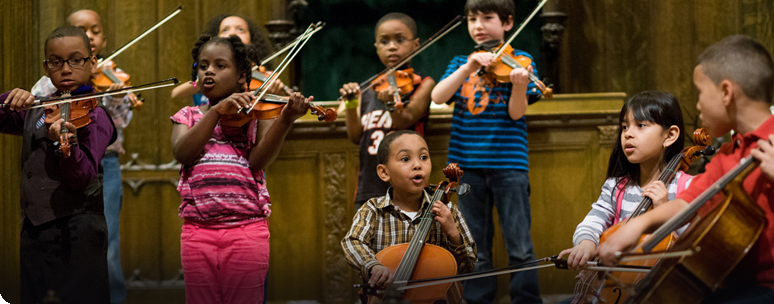El Sistema’s Open Secrets
Artist-educator Eric Booth recently shared some reflections after returning from his second trip to Venezuela and that country's amazing national music education program.
The truly radical promise of El Sistema is that it invites a rediscovery of the purposes and processes of classical music. As our field in the U.S. struggles to find the relevance of classical music to more than the small “arts club” percentage of our populace, El Sistema proposes answers that can change not only the life trajectories of our at-risk children, but the trajectory of our at-risk arts culture.
One statement I sometimes witness in the U.S. makes my blood run cold. As some hear about how the program works in Venezuela, they say, “We already do that.” No we don’t. We do many things that look very similar to the teaching and learning practices in Venezuela. This essay hopes to illuminate what it is they are doing that is not what we already do, and what it is we must humbly, patiently commit ourselves to learn.
Read Eric's essay in its entirety here.
An excerpt of interest:
I see the dynamism of seemingly opposed directions in the musical choices. Everyone “knows” El Sistema is a “classical music” program; and yet, there is a lively presence of folk and popular music, even jazz appears in some places. Also, many new Latin American composers are composing hybrid music that defies category and fits with El Sistema processes. El Sistema is alive with music people love, that is the greater goal, and this makes it both a classical music program and, equally truthfully, a many-kinds-of-music program.
Another:
In the U.S., the ethos of continual improvement is an oft-stated article of faith in many industries that is rarely fully embodied. El Sistema lives that article of faith so naturally, from top to bottom, from the youngest student up through Dr. Abreu’s endless curiosity, that it is the very nature of the endeavor. Indeed, the energy of experimentation and aspiration is so palpable that El Sistema feels more like an inquiry than an institution.
One more favorite excerpt:
As Dr. Abreu says, “We believe a certain level of chaos is important for us.” I confess I am not sure all his administrators welcome the norms of chaos that Maestro Abreu enjoys, but they all go with the flow of it as an intentional part of their constantly-growing endeavor.
-Heath Marlow, CMW staff
|
